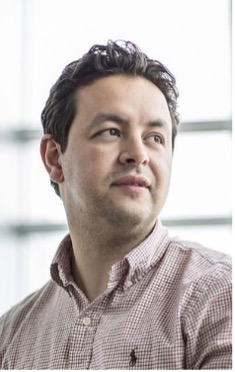Oussama Moutanabbir
Oussama Moutanabbir
Ph.D. in Energy and Materials Science, 2005
Full Professor, Department of Engineering Physics, Polytechnique Montréal

“My time at INRS taught me to distance myself from fashionable topics and focus instead on niche topics or new ways of doing things based on my ability to offer answers to fundamental questions, to make a contribution that has an impact on society.”
Fascinated for as long as he can remember by physics and the theoretical calculations of particle-matter interactions, Professor Moutanabbir believes that his career is not pre-planned, but simply the result of a series of interesting accidents and coincidences. According to him, his achievements are due to the fact that he always says “yes” to the opportunities that come his way. It was Professor Bernard Terreault’s encouragement that led him to leave Morocco after obtaining a bachelor’s degree in physics to test his calculations in the laboratory at the Institut national de la recherche scientifique (INRS) in Varennes.
After arriving in Quebec on December 20, 2000, it is the intellectual richness, the culture and the freedom to experiment that he remembers from his “exciting and frightening” studies at the INRS Centre Énergie Matériaux Télécommunications research and training centre. The physicist who preferred theory to practice admits that it took him several weeks to simply find the switch to turn on a machine in Professor Terreault’s laboratory. He remembers the INRS campus in Varennes as an insular community where he could engage in rich conversations at the drop of a hat with professors he met in the corridors. “There was a very nice sense of community,” he says. “More than in conventional academic environments, the professors there were very generous of their time, focused on research, and you felt they could converse and think with the students. I experienced many accidents of ideas that stimulated my work,” he adds.
Beyond his research into the isotopic effects in semiconductors—which generated little interest among Canadian researchers and even less among industrialists at the time—he remembers the vitality of the student environment, where pizza was shared on Fridays and soccer was played with neighbours and colleagues from Hydro-Québec’s research institute (IREQ). The relationships he built with members of the student and faculty community continue to this day. “Every time someone from INRS asks me to participate in something, I accept without hesitation,” he says. It was also in Montreal that he met the woman he would start a family with while travelling the world and through whom he later returned to Quebec.
Reflecting on what has marked his journey from INRS, he points out that he chose to do his research on subjects that almost no one else was passionate about. “My time at INRS taught me to distance myself from fashionable topics and focus instead on niche topics or new ways of doing things based on my ability to offer answers to fundamental questions, to make a contribution that has an impact on society,” he says. This approach has led him to publish and disseminate the results of his research around the world, before moving on to the Max-Planck Institute of Physics in Germany and continuing his research at Keio University in Japan, in close collaboration with the University of California at Berkeley in the United States. The “world unique” research program that resulted from his experiments and meshes originating at INRS has carried over to Polytechnique Montreal where he is now a full professor in the Engineering Physics Department, with particular expertise in quantum and nanoscopic semiconductors that earned him a Tier 2 Canada Research Chair.
Back in Montreal with his family, he appreciates his good fortune: “I enjoy giving students the ability to build their own path, to offer opportunities to young people, like the ones I was offered. There is no better privilege than to help others achieve their dreams,” he says. He advises students to choose a work environment that will allow them the freedom to explore outside the box. He stresses that once you find that environment, “you have to be very rigorous and follow through, persevere. To have a real impact, you need persistence and resilience. Without that, it’s impossible to establish new frontiers of knowledge or to transfer technology.” He concludes: “There is no such thing as boring science, only people who get bored too quickly.”
[As told to the Foundation in April 2023.]
